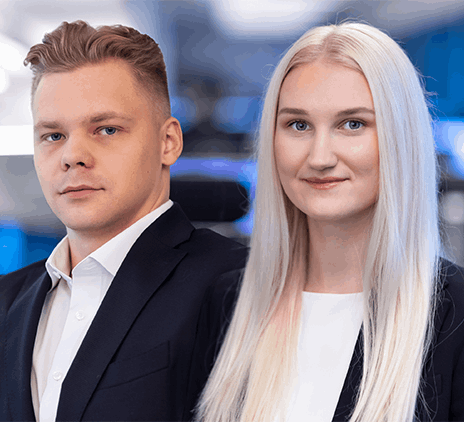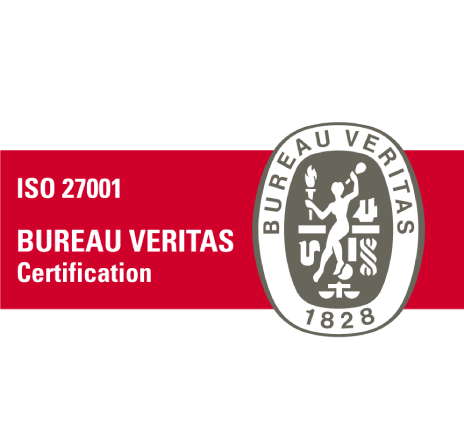-
Other audit services
We help clients with the application and use of foreign financial aid of EU and other funds and help prepare financial reports.
-
Audit calculator
The calculator will answer if the company's sales revenue, assets or number of employees exceed the limit of an inspection or audit.
-
Payroll and related services
We perform payroll accounting for companies whether they employ a few or hundreds of employees.
-
Tax accounting
Grant Thornton Baltic's experienced tax specialists support accountants and offer reasonable and practical solutions.
-
Reporting
We prepare annual reports in a timely manner. We help to prepare management reports and various mandatory reports.
-
Consolidation of financial statements
Our experienced accountants and advisors help you prepare consolidation tables and make the consolidation process more efficient.
-
Consultancy and temporary staff
Our experienced specialists advise on more complex accounting transactions, rectify poor historic accounting, and offer the temporary replacement of an accountant.
-
Outsourced CFO service
Our CFO service is suitable for companies of all sizes and in all industries. We offer services to our clients in the required amount and competences.
-
Assessment of accounting processes
We help companies to implement accounting practices that are in compliance with local and international standards.
-
Accounting services for small businesses
We offer affordable service for small businesses. We help organize processes as smartly and cost-effectively as possible.
-
Cryptocurrency accounting
We keep up with blockchain technology to serve and advise crypto companies. We are supported by a network of colleagues in 130 countries.
-
Trainings and seminars
Our accountants have experience in all matters related to accounting and reporting. We offer our clients professional training according to their needs.

-
Business advisory
We offer legal support to both start-ups and expanding companies, making sure that all legal steps are well thought out in detail.
-
Fintech advisory
Our specialists advise payment institutions, virtual currency service providers and financial institutions.
-
Corporate advisory
We advise on legal, tax and financial matters necessary for better management of the company's legal or organizational structure.
-
Transaction advisory
We provide advice in all aspects of the transaction process.
-
Legal due diligence
We thoroughly analyze the internal documents, legal relations, and business compliance of the company to be merged or acquired.
-
In-house lawyer service
The service is intended for entrepreneurs who are looking for a reliable partner to solve the company's day-to-day legal issues.
-
The contact person service
We offer a contact person service to Estonian companies with a board located abroad.
-
Training
We organize both public trainings and tailor made trainings ordered by clients on current legal and tax issues.
-
Whistleblower channel
At Grant Thornton Baltic, we believe that a well-designed and effective reporting channel is an efficient way of achieving trustworthiness.

-
Business model or strategy renewal
In order to be successful, every company, regardless of the size of the organization, must have a clear strategy, ie know where the whole team is heading.
-
Marketing and brand strategy; creation and updating of the client management system
We support you in updating your marketing and brand strategy and customer management system, so that you can adapt in this time of rapid changes.
-
Coaching and development support
A good organizational culture is like a trump card for a company. We guide you how to collect trump cards!
-
Digital services
Today, the question is not whether to digitize, but how to do it. We help you develop and implement smart digital solutions.
-
Sales organisation development
Our mission is to improve our customers' business results by choosing the right focuses and providing a clear and systematic path to a solution.
-
Business plan development
A good business plan is a guide and management tool for an entrepreneur, a source of information for financial institutions and potential investors to make financial decisions.
-
Due diligence
We perform due diligence so that investors can get a thorough overview of the company before the planned purchase transaction.
-
Mergers and acquisitions
We provide advice in all aspects of the transaction process.
-
Valuation services
We estimate the company's market value, asset value and other asset groups based on internationally accepted methodology.
-
Forensic expert services
Our experienced, nationally recognized forensic experts provide assessments in the economic and financial field.
-
Business plans and financial forecasts
The lack of planning and control of cash resources is the reason often given for the failure of many businesses. We help you prepare proper forecasts to reduce business risks.
-
Outsourced CFO service
Our CFO service is suitable for companies of all sizes and in all industries. We offer services to our clients in the required amount and competences.
-
Reorganization
Our experienced reorganizers offer ways to overcome the company's economic difficulties and restore liquidity in order to manage sustainably in the future.
-
Restructuring and reorganisation
We offer individual complete solutions for reorganizing the structure of companies.
-
Corporate taxation
We advise on all matters related to corporate taxation.
-
Value added tax and other indirect taxes
We have extensive knowledge in the field of VAT, excise duties and customs, both on the national and international level.
-
International taxation
We advise on foreign tax systems and international tax regulations, including the requirements of cross-border reporting.
-
Transfer pricing
We help plan and document all aspects of a company's transfer pricing strategy.
-
Taxation of transactions
We plan the tax consequences of a company's acquisition, transfer, refinancing, restructuring, and listing of bonds or shares.
-
Taxation of employees in cross-border operations
An employee of an Estonian company abroad and an employee of a foreign company in Estonia - we advise on tax rules.
-
Tax risk audit
We perform a risk audit that helps diagnose and limit tax risks and optimize tax obligations.
-
Representing the client in Tax Board
We prevent tax problems and ensure smooth communication with the Tax and Customs Board.
-
Taxation of private individuals
We advise individuals on personal income taxation issues and, represent the client in communication with the Tax and Customs Board.
-
Pan-Baltic tax system comparison
Our tax specialists have prepared a comparison of the tax systems of the Baltic countries regarding the taxation of companies and individuals.
-
Internal audit
We assist you in performing the internal audit function, performing internal audits and advisory work, evaluating governance, and conducting training.
-
Internal Audit in the Financial Services Sector
We provide internal audit services to financial sector companies. We can support the creation of an internal audit function already when applying for a sectoral activity license.
-
Audit of projects
We conduct audits of projects that have received European Union funds, state aid, foreign aid, or other grants.
-
Prevention of money laundering
We help to prepare a money laundering risk assessment and efficient anti-money laundering procedures, conduct internal audits and training.
-
Risk assessment and risk management
We advise you on conducting a risk assessment and setting up a risk management system.
-
Custom tasks
At the request of the client, we perform audits, inspections and analyzes with a specific purpose and scope.
-
External Quality Assessment of the Internal Audit Activity
We conduct an external evaluation of the quality of the internal audit or provide independent assurance on the self-assessment.
-
Whistleblowing and reporting misconduct
We can help build the whistleblowing system, from implementation, internal repairs and staff training to the creation of a reporting channel and case management.
-
Information security management
We provide you with an information security management service that will optimise resources, give you an overview of the security situation and ensure compliance with the legislation and standards.
-
Information security roadmap
We analyse your organisation to understand which standards or regulations apply to your activities, identify any gaps and make proposals to fix them.
-
Internal audit of information security
Our specialists help detect and correct information security deficiencies by verifying an organization's compliance with legislation and standards.
-
Third party management
Our specialists help reduce the risks associated with using services provided by third parties.
-
Information security training
We offer various training and awareness building programmes to ensure that all parties are well aware of the information security requirements, their responsibilities when choosing a service provider and their potential risks.
-
Digital Operational Resilience Act (DORA)
We will help you create a DORA implementation model that meets your company's needs and ensures that you meet the January 2025 deadline.

-
ESG advisory
We help solve issues related to the environment, social capital, employees, business model and good management practices.
-
ESG audit
Our auditors review and certify sustainability reports in line with international standards.
-
Sustainable investments
We help investors conduct analysis of companies they’re interested in, examining environmental topics, corporate social responsibility and good governance practices.
-
Sustainable tax behaviour
Our international taxation specialists define the concept of sustainable tax behaviour and offer services for sustainable tax practices.
-
ESG manager service
Your company doesn’t necessarily need an in-house ESG manager. This role can also be outsourced as a service.

-
Recruitment services – personnel search
We help fill positions in your company with competent and dedicated employees who help realize the company's strategic goals.
-
Recruitment support services
Support services help to determine whether the candidates match the company's expectations. The most used support services are candidate testing and evaluation.
-
Implementation of human resource management processes
We either assume a full control of the launch of processes related to HR management, or we are a supportive advisory partner for the HR manager.
-
Audit of HR management processes
We map the HR management processes and provide an overview of how to assess the health of the organization from the HR management perspective.
-
HR Documentation and Operating Model Advisory Services work
We support companies in setting up HR documentation and operational processes with a necessary quality.
-
Employee Surveys
We help to carry out goal-oriented and high-quality employee surveys. We analyse the results, make reports, and draw conclusions.
-
HR Management outsourcing
We offer both temporary and permanent/long-term HR manager services to companies.

-
Digital strategy
We help assess the digital maturity of your organization, create a strategy that matches your needs and capabilities, and develop key metrics.
-
Intelligent automation
We aid you in determining your business’ needs and opportunities, as well as model the business processes to provide the best user experience and efficiency.
-
Business Intelligence
Our team of experienced business analysts will help you get a grip on your data by mapping and structuring all the data available.
-
Cybersecurity
A proactive cyber strategy delivers you peace of mind, allowing you to focus on realising your company’s growth potential.
-
Innovation as a Service
On average, one in four projects fails and one in two needs changes. We help manage the innovation of your company's digital solutions!

Start-ups are playing an increasingly important role in the Estonian economy – about 550 start-ups are operating in Estonia, paying more than 3,700 people an average of around 2,200 euros a month in earnings, and employing hundreds of people outside Estonia.
The impact of start-ups on the economy will probably soon become defining because their growth rate is many times faster than that of established companies. Start-ups are the main drivers of trends on the job market and pose new challenges for the education system and society. As Estonia is a promising place for start-ups, talented people are also gravitating here from other countries and our own top brains do not have to leave the country to find employment. The innovation spawned at start-ups takes us a step closer to a knowledge-based economy. It is no wonder that interest in investment into start-ups is growing: last year, a record 330 million euros was invested into Estonian start-ups.
But to get investors – whether they are friends and acquaintances or business angels – to want to put their money into start-ups, they have to believe in the business model. That immediately brings up the question of how to view a business where economic results cannot be used to gauge the company’s potential? Rapid growth is encoded in the DNA of start-ups and fast growth usually means being in the red for a while. So a start-up does not have much to show at the outset besides a brilliant business idea and belief in it.
How to sell trust?
Start-ups, then, are operating in a dark room, figuratively speaking – they do not know exactly what their customers need but rather are testing the market and product and at some point they usually suffer setbacks. That means the two key factors for gaining investor trust are the executive and the team. It is the team’s experiences and specialised knowledge and the leader’s capability to keep people’s motivation high that give – or don’t give – investors confidence that the start-up’s business model will be successful. If a team is capable of learning fast, including what works and what does not, it has vitality and that is what backers want to see. Telling the company’s story is also very important – it is possible to “sell” the team and its skills even if there is no product to show yet.
Something else that really contributes to success is being able to achieve the lead position in the respective field. Being tops in a market is a big advantage because it comes with media coverage, essentially free marketing. That in turn means better opportunities for finding funding, talent and business contacts.
Products and services beyond people’s dreams
In broad strokes, it can be said that start-ups create needs the market does not know about yet. A good example is the producer of Estonian electric cars, Nobe. Electric cars are not new, but Nobe is: it has three wheels and a striking retro look. Last September, Nobe raised more than 250,000 euros through the FundedByMe investment platform in Sweden, the prototype for the car is ready, and the first customers have placed pre-orders. Will Nobe be a success story or not? No one knows – there has not been such a product before.
I hope Nobe does not fall into the trap of offering a convenience product that is not what people really need. To avoid this trap, you have to ask yourself: what problem are you trying to solve by developing your product or service? Why should anyone pay money for it and how many people can afford it? The Estonian start-up Creatomus has succeeded in answering this question. With a clientele of real estate developers, Creatomus is not a construction company but a tech company that deals with optimising the residential building construction process, from planning of details to the start of construction, reducing bureaucracy and time expense by at least one-third. This solved a major problem in this field, and that has ensured rapid growth for them.
Start-ups also “feed” the traditional economy
Rapid growth is a natural part of the development of a start-up and their needs grow apace. Among other things, that means business opportunities for businesses in the traditional economy such as business advisory service providers and law offices. Our experience at Grant Thornton Baltic shows that consultation for start-ups “forces” us to learn and tackle topics such as AI – machine learning – and blockchain technology. Thus, there are two benefits for us as a traditional business – besides selling services such as accounting, company valuation or financial forecasts, we can also amass much new knowledge. And knowledge, of course, is one very important resource for ensuring growth and sustainability.
Related services:
Financial advisory Business advisory Business plans and financial forecasts









